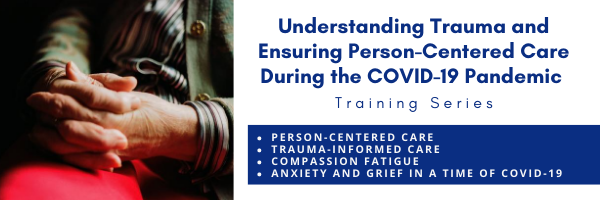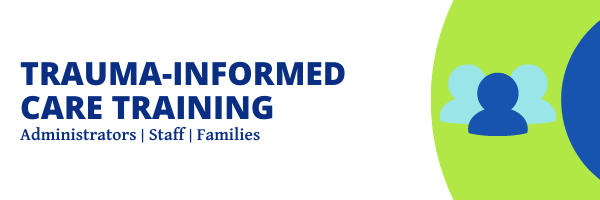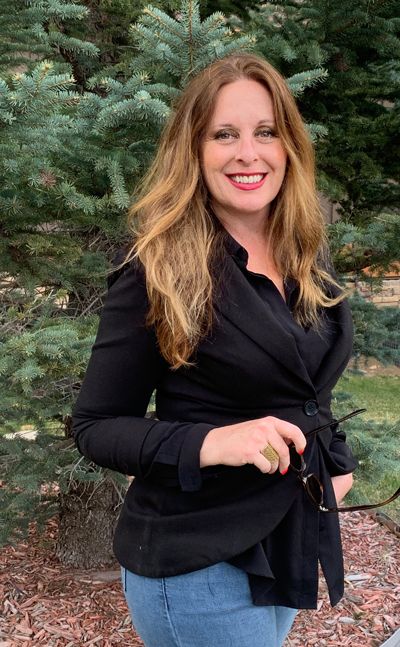Specialized Information for:
Nursing HomesAssisted Living/Board & Care Home and Community Based Services
Specialized Information for:
Nursing HomesAssisted Living/Board & Care Home and Community Based Services
Jump to:
Jump to:
Resuming In-Person Visits During COVID-19: Tips for Identifying Trauma, Potential Abuse, and Supporting Residents (June 18, 2021)
Webinar Materials
COVID-19 Recovery and Reentry Resources: TA Open Dialogue Webinar Series (April 27, May 11, and May 25, 2021)
Session One: Successful Volunteer Recruitment, Training, and Retention During COVID-19
This webinar shared successful volunteer recruitment, training, and retention examples from Oregon and Ohio programs.
Webinar Materials
Speakers: Mary Book, Volunteer Coordinator for the Ohio Area Agency on Aging, District 7; Beverley Laubert, Ohio State Long-Term Care Ombudsman; and Natascha Adams, Volunteer Recruitment Specialist for the Oregon Office of the Long-Term Care Ombudsman
Session Two: Successful Communication During COVID-19
This webinar shared examples of successful communication between residents, their family members, and the Ombudsman program.
Webinar Materials
Speakers: Patty Ducayet, Texas State Long-Term Care Ombudsman; Shazia Sultan, Manager, Brazos Valley Long-Term Care Ombudsman Program, Texas; and Heidi L'Esperance, Regional Long-Term Care Ombudsman, Snohomish County, Washington
Session Three: Successful Complaint Investigation and Resolution During COVID-19
This session explored how Ombudsman programs have successfully advocated with and for residents, despite in-person visitation restrictions and other barriers.
Webinar Materials
Speakers: Amanda Grooms, Buffalo Trace District Ombudsman, Kentucky; Zev Samuels, District (R9) Long-Term Care Ombudsman, Tennessee; Kim Boyd, District 7 Long-Term Care Ombudsman, Tennessee; Melinda Lunday, Middle Tennessee District Long-Term Care Ombudsman, Tennessee; Thomas Kahler, District 2 Long-Term Care Ombudsman, Tennessee; Teka Moten, Tennessee State Long-Term Care Ombudsman
Ombudsman Program Communication and Advocacy During COVID-19 (June 23, 2020)
View the PowerPoint slides as a PDF or PPT.
COVID-19 and Ombudsman Programs: Understanding How Trauma Impacts You, Residents, and Your Advocacy
In partnership with the Colorado Long-Term Care Ombudsman program, Consumer Voice and NORC offered a four-part webinar series regarding the impact of trauma due to the COVID-19 pandemic on long-term care residents and Ombudsman programs. The webinar series highlighted important themes related to trauma-informed care, person-centered care, compassion fatigue, and vicarious trauma. The series included case studies, self-reflection activities and exercises, and materials for attendees.
View the slides as a PDF or PowerPoint with presenter notes.
View the slides as a PDF or PowerPoint with presenter notes.
View the slides as a PDF or PowerPoint with presenter notes.
View the slides as a PDF or PowerPoint with presenter notes.

In partnership with Dr. Sheri Gibson (see bio below), NORC published this free four-part series for three audiences (family members of individuals living in long-term care facilities, facility administrators, and direct care staff). In the series, Dr. Gibson provides training on the following topics: person-centered care, trauma-informed care, compassion fatigue, and anxiety and grief in a time of COVID-19. Each topic will include one webinar recording and slides for each audience.
Jump to training on:
Person-Centered Care for Administrators | Staff | Families
Trauma-Informed Care for Administrators | Staff | Families
Compassion Fatigue for Administrators | Staff | Families
Anxiety and Grief in a Time of COVID-19 for Administrators | Staff | Families

During the COVID-19 pandemic, there have been millions of positive COVID-19 cases and hundreds of thousands of COVID-19 related deaths in our country. Although we are all impacted by the pandemic, individuals living in long-term care facilities are particularly vulnerable to the disease and their daily lives and access to loved ones has been impacted significantly reinforcing the need for person-centered care.
This training will emphasize the importance of providing person-centered care as a vital component to ensuring care recipients are involved in and respected for their individual differences. Placing people at the center of their care has multiple benefits including improving the quality of services provided, helping people obtain the care they need when they need it, empowering people to be more active in their care, and reducing some of the pressures experienced by those working in long term care communities as well as families supporting their loved ones residing in long term care.
Learning Objectives for Person-Centered Care Training
View the slides as a PDF or PPT.
A Primer for Direct Care Staff
View the slides as a PDF or PPT.
View the slides as a PDF or PPT.

The psychological effects of long-term isolation on both residents and families are largely unknown at this time as our nation remains in the grips of a global pandemic. However, when armed with education and resources, communities and people are empowered toward collective resilience. This training will emphasize the importance of understanding the prevalence of trauma and the effects that trauma can have on an individual’s mental health, physical, social, and spiritual well-being so as to provide care that is sensitive to individual values while resisting the re-traumatization of vulnerable persons.
Learning Objectives for Trauma-Informed Care Training
View the slides as a PDF or PPT.
A Primer for Direct Care Staff
View the slides as a PDF or PPT.
View the slides as a PDF or PPT.

The current global pandemic has demanded a lot of our humanity. Our minds, hearts, and spirits are unavoidably challenged by the daily news feeds of rising deaths, human grief, and suffering. If we do not attend to ourselves compassionately (as we often do towards others), we are at risk of the erosion of our personal wellbeing. This training will focus on educating attendees on the distinct differences between sympathy, empathy, and compassion; as well as the differences between compassion fatigue, burnout, and vicarious trauma. Attendees will learn to identify the external and internal factors that increase one’s risk for compassion fatigue and the common associated warning signs. Attendees will have access to formal measures used to assess compassion fatigue and effective strategies will be shared to prevent the onset or worsening of symptoms.
Learning Objectives for Compassion Fatigue Training
View the slides as a PDF or PPT.
A Primer for Direct Care Staff
View the slides as a PDF or PPT.
View the slides as a PDF or PPT.

The current global pandemic can affect us in many different ways: physically, socially, and psychologically. We are dealing with the very real challenges associated with widespread serious illness and the inabilities of healthcare systems to cope with it. The social and community disruptions, economic fallout, and financial problems facing American families have resulted in obstacles and interruptions to many aspects of life. Additionally, the pandemic has resulted in enormous loss of life in the United States. The collateral damage that this level of mortality could exact on American families cannot be overlooked. This training will provide education about anxiety and grief, and will provide effective tools to assist in improving well-being.
Learning Objectives for Anxiety and Grief Training:
View the slides as a PDF or PPT.
A Primer for Direct Care Staff
View the slides as a PDF or PPT.
View the slides as a PDF or PPT.
 Dr. Gibson received her Ph.D. in Clinical Psychology with an emphasis in Geropsychology from the University of Colorado, Colorado Springs (UCCS). She is an instructor for the Psychology Department at UCCS and a faculty affiliate with the UCCS Gerontology Center. Dr. Gibson serves on the editorial board for the Journal of Elder Abuse & Neglect, is Chair of the Colorado Coalition for Elder Rights and Abuse Prevention (CCERAP), a member of the Research Committee for the National Adult Protective Services Association (NAPSA), and board member for the Colorado Culture Change Coalition. In addition to being an advocate for elder justice, Dr. Gibson has a private psychotherapy and consultation practice, which includes provision of capacity evaluations, expert testimony, consultation, and training.
Dr. Gibson received her Ph.D. in Clinical Psychology with an emphasis in Geropsychology from the University of Colorado, Colorado Springs (UCCS). She is an instructor for the Psychology Department at UCCS and a faculty affiliate with the UCCS Gerontology Center. Dr. Gibson serves on the editorial board for the Journal of Elder Abuse & Neglect, is Chair of the Colorado Coalition for Elder Rights and Abuse Prevention (CCERAP), a member of the Research Committee for the National Adult Protective Services Association (NAPSA), and board member for the Colorado Culture Change Coalition. In addition to being an advocate for elder justice, Dr. Gibson has a private psychotherapy and consultation practice, which includes provision of capacity evaluations, expert testimony, consultation, and training.